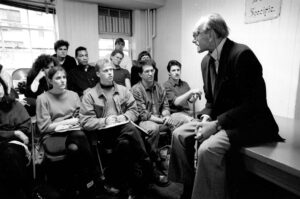

Useful Links
Contact
- The Bridge at Cecil Sharp House
- 2 Regent’s Park Rd, London NW1 7AY
- 020 7424 0860
- admin@thebridge-ttc.org
Social Media


An acting CV or acting resume is a document that displays key information about you as an actor – most notably the acting credits and experience that you have. Having a CV is essential for an actor as it’s a convenient way for industry professionals to know more about you by having all your important details in one place. You’ll probably end up giving out a lot of copies of your CV, both in digital and print form, so you best get to work making it look as good as it can be.
Most acting CVs follow a similar format containing essential information such as:
Headshot
You should include a photo of yourself so people can see what you look like to determine whether you have the right look for a role. Headshots should be high-quality and done by a professional photographer. They should also accurately represent you and be up-to-date.
Physical details
You should include basic physical details that people may use to determine your suitability for certain castings. This can include height, weight, eye colour, hair colour, and your playing age range (not your actual age). Also include details about your voice such as tone (e.g. husky), accents, and any second languages. If you can, also include your singing type e.g. contralto.
Contact details
If someone gets a copy of your CV they need a way to contact you if they’re interested in working with you. Include your email address, phone number, and links to your website or social media.
Agent details
If you have agency representation then make sure to include their contact details too. It generally looks better having representation and people may want to contact them directly.
Spotlight pin
Once you have a sufficient number of acting credits, you’ll be able to join Spotlight and get a profile with an ID number or pin. If you are a member of Equity then make sure it mentions that too.
Training you’ve received
Make sure to include all the relevant training you have. This should be anything related to performing including dance or stage combat. You may be viewed negatively if you don’t have a sufficient amount of training. Typically you’re expected to have received drama school training to be an actor so you’ll want to include when and where you did this.
Special skills
If you have any unique or interesting skills then sometimes it can be useful to include these. These could be stage combat, horse riding, skateboarding, musical instruments, etc.
Acting credits
Every time you appear in a production you’ll want to include it on your CV as an acting credit. This should appear in list form with details of when and where the production took place and who directed it. Newer or high profile credits should appear at the top of the list. The more credits you have the more experienced you’ll be and this will come across on your CV. Make sure the reader can easily distinguish between television and film credits.
A good layout
The overall layout can be the first thing the reader notices so keep this neat and professional. The content should be evenly spaced out and not too close to the outer edges. Keep the text and background as black and white. Also make sure the text is large enough to read.
Age
You don’t need to include your age or birth date. Instead put your playing range with a ten year range e.g. 20-30. These should be ages that you could realistically play.
Details that are too personal
While you need contact details so people can get in touch with you, you want to make sure you don’t include anything that’s personal to you that people can take advantage of such as your physical address or national insurance number.
Times when you were an extra
In your acting credits don’t include any work as an extra or background artist – especially if it was a non-speaking role. Most people don’t count these as actual acting credits and it can make you look low-level.
Lies
It may sound obvious but don’t include any lies! This is surprisingly common practice and it shouldn’t be. It will look incredibly unprofessional if you get caught out and you may get blacklisted. Also don’t describe yourself as an experienced actor if you have few credits or none at all.
For those industry professionals who have to sift through countless acting CVs, such as casting directors and agents, it helps them if you keep all your CV’s information on one side i.e. one page. They may take an instant dislike to you if your CV is extra long while all the others are shorter. If you have a large amount of acting credits, you can select your best ones and present them as career highlights to save space.
You can still create an acting CV even if you don’t have much experience yet. Without acting credits though that section of your CV will look sparse and you may struggle to impress. The way to bulk it out is to get more credits to your name even if they are low-level. Try getting parts in short films, local theatre, or online video projects. You can also add your drama school credits to your CV.
Creating a CV yourself can be daunting the first time so it’s always good to have help. To get you started, here is an acting CV template below for you to amend as needed. You’ll need to edit your CV regularly to perfect it and add new acting credits when you get them. Make sure to convert documents into PDF form before sending out so the formatting stays intact for the reader on their device.
Click CV To Download!
When it comes to being a professional actor there are countless things you need to know in order to excel in the acting industry. At The Bridge Theatre Training Company we include professional studies work as part of our acting courses to provide you with everything you need to navigate the acting industry and be a professional working actor.
